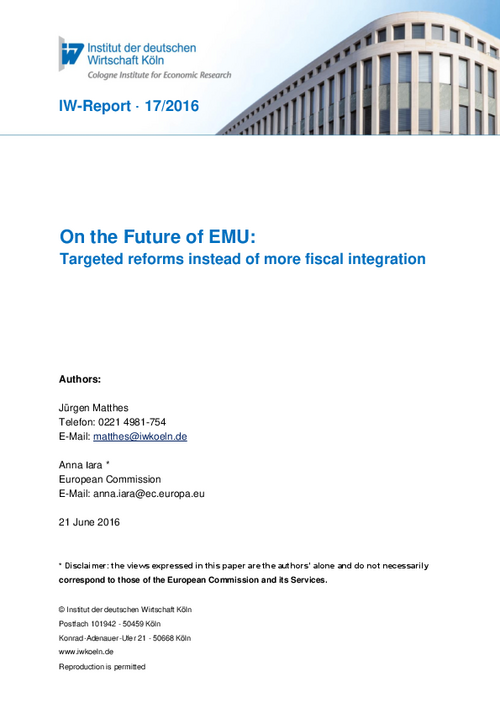According to a dominant narrative, the recent crisis has allegedly shown that EMU is not sustainable without fiscal risk sharing. We question this narrative and suggest that a limited set of reforms (mostly focusing on the financial sector) would suffice to make EMU sustainable.

Targeted reforms instead of more fiscal integration: What is the future for the Economic and Monetary Union (EMU) going to be like?
IW-Report

According to a dominant narrative, the recent crisis has allegedly shown that EMU is not sustainable without fiscal risk sharing. We question this narrative and suggest that a limited set of reforms (mostly focusing on the financial sector) would suffice to make EMU sustainable.
This debate has gained traction recently with the Five-Presidents-Report and a work programme of the EU Commission.
In brief, we argue that:
- The recent crisis was exceptional, because several extraordinary factors contributed to its severity that are unlikely to repeat.
- The remaining crisis legacy is likely to be temporary and should thus be tackled with temporary instruments only, such as the ECB’s unconventional monetary policy, for example.
- Reforms already implemented and yet to be taken can prevent excessive financial cycles in the future so that future crises in the euro area will be less severe.
- The functioning of EMU has been improved by recent reforms and need to be enhanced by some additional reforms mainly regarding the financial market.
- On this basis, euro area countries will be much better able to deal with idiosyncratic crises of a more “standard” size.

Jürgen Matthes / Anna Iara: On the Future of EMU: Targeted reforms instead of more fiscal integration
IW-Report

Targeted reforms instead of more fiscal integration: What is the future for the Economic and Monetary Union (EMU) going to be like?
IW-Report
Jürgen Matthes: On the Future of EMU: Targeted reforms instead of more fiscal integration – Extended Summary

33. Finanzmarkt Round-Table: De-Industrialisierung – Gefahr für den Finanz- und Wirtschaftsstandort Deutschland?
Das Institut der deutschen Wirtschaft, die DekaBank und die Börsen-Zeitung laden Sie zum Finanzmarkt Round-Table am Montag, den 29. April 2024 von 10:30 bis 12:30 Uhr ein. Der Round-Table findet als Online-Veranstaltung statt.
IW
Deindustrialisierung: Aktuelle Entwicklungen von Direktinvestitionen
Obwohl sich die Situation bei den Energiekosten nach den Turbulenzen der letzten Jahre wieder etwas entspannt hat, sehen wir weiterhin hohe (Netto-)Abflüsse von Direktinvestitionen aus Deutschland. Das deutet darauf hin, dass die Perspektiven am Standort ...
IW